- Home
- Shelby Foote
The Civil War: A Narrative: Volume 2: Fredericksburg to Meridian Page 43
The Civil War: A Narrative: Volume 2: Fredericksburg to Meridian Read online
Page 43
He hoped it would bring an all-out Confederate attack; or so at least he had been saying, all afternoon and evening. “The rebel army is now the legitimate property of the Army of the Potomac,” he announced to the officers gathered about him in the May Day sunshine on the Chancellor veranda. The fact that nearly all of his cavalry had ridden well beyond his reach, while nearly all of Lee’s was in what Hooker called “my immediate presence,” did not seem to him a cause for alarm, but rather an advantage, “which I trust will enable Stoneman to do a land-office business in the interior. I think the enemy in his desperation will be compelled to attack me on my own ground.… I am all right.” Thus he wired the Washington authorities, thinking that such information, besides relieving the President’s concern, might “have an important bearing on movements elsewhere.” If the other Union armies would only keep step with this one, the war would soon be over and done with—won. As the daylight hours wore on and his intrenchments were extended, still with no full-scale rebel assault, his show of confidence reached its zenith. He feared nothing and he wanted it known; not even the artillery of heaven. “The enemy is in my power,” he exulted, “and God Almighty cannot deprive me of them.” In the late afternoon he issued another circular for the encouragement of subordinates: “The major general commanding trusts that a suspension in the attack today will embolden the enemy to attack him.”
5
Lee and Jackson met at sundown, on the plank road just over a mile southeast of Chancellorsville, for the purpose of deciding how best to go about giving Hooker what he claimed he wanted. They began their conference on the road itself, at the junction where a trail came in from Catharine Furnace, a rural ironworks on Lewis Creek a mile and a half to the west, but they withdrew presently into a nearby clump of pines when a Federal sharpshooter began ranging in on them from a perch in a tree just up the road, beyond the line along which Anderson’s and Slocum’s pickets were keeping up a rackety contention. Seated side by side on a log, the two men continued their discussion in the May Day twilight, the gray-bearded elder impeccably dressed as always, his neat gray tunic devoid of trappings except for the three unwreathed stars on each side of the turned-down collar, and the younger wearing the rather gaudy uniform which had provoked such hoots and catcalls on the day of Fredericksburg. Reconnoitering on the right this afternoon, Lee had found the terrain unpromising, hemmed in as it was by a bend of the Rappahannock, and the few heavily wooded approaches well guarded by troops already dug in along the far side of a marsh. To attempt to come to grips with them in that quarter, he said, would be to invite destruction. How about the center and the left? Jackson had not been far to the west, but he had made a long-range examination of the enemy lines in front of Chancellorsville itself and had found the bluecoats disposed three-deep, hard at work with picks and shovels, and supported by many batteries of artillery. However, he was inclined to believe that the question of how to get at Hooker, here in the Wilderness tomorrow, was largely academic. The ease with which he had repulsed the advancing Union columns today made him suspect that their recoil was prelude to a withdrawal. “By tomorrow morning there will not be any of them on this side of the river,” he declared.
Lee shook his head. So far he had deferred to Stonewall’s judgment, but not in this. Though he too was puzzled by his opponent’s sudden, turtle-like reaction to moderate pressure, he was convinced that Hooker was planning to make his main effort right here. Anyhow, even if that were not the case, they must prepare to deal with him tomorrow on even the outside chance that he would still be in his present intrenched position. Without quite giving over his belief that dawn would show the forest empty to their front, Jackson could not disagree with the logic of Lee’s contention; besides which, he found the prospect so attractive as to overrule his inclination to think that it would not be offered. For him, as for his commander, to “deal with” Hooker meant to attack him. But how? And where? One possibility was that the Federal center might not appear as stout to a close-up view as it had seemed from a distance. The two generals accordingly dispatched an engineer officer from each of their staffs to go take a look at the intrenchments there and report on what they saw.
While this night reconnaissance was in progress, and while Lee and Jackson continued to speculate on ways of bringing the blue army’s current excursion to a violent close, Jeb Stuart came jingling up from Catharine Furnace in fulfillment of his promise to “help all I can when the ball opens.” Glad as he was to see his friend Stonewall decked out in the handsome uniform he had given him, he deferred comment in favor of some interesting information which had just come to hand. According to Fitzhugh Lee, who had ridden west to scout it, Hooker’s right flank was “in the air” on the Orange Turnpike, wide open to attack from that direction. Though this was news of a kind to set both him and his chief lieutenant on tremble, the southern commander suppressed his excitement to ask whether roads were available for a covered approach to that critical point by troops in large numbers. Stuart replied that he did not know but he would do what he could to find out, and with that he swung back onto his horse and rode off westward, his red-lined cape and cinnamon whiskers glistening in the light of the new-risen moon.
From this time on, Lee and Jackson gave little attention to anything but the possibility of launching the suggested flank attack. When the two engineers returned to announce that the Union center was too strongly intrenched to be assaulted, Lee received the anticlimactic report with a nod and kept peering at a map spread on his knees; he peered so intently, indeed, that he seemed to be trying to make it give him information which it did not contain. “How can we get at those people?” he asked, half to himself and half to Jackson, who replied in an equally distracted manner, as he too searched the map for roads that were not on it: “You know best. Show me what to do, and we will do it.” Finally, Lee traced a fingertip westward along the map from their present location, as if to sketch in an ideal route past the front of the enemy position, then northward to intersect the turnpike, where the latter veered abruptly east to address the Union flank end-on. In naval parlance, he was crossing Hooker’s T. That would be the movement, he said; Jackson would lead it and Stuart would cover his march. Smiling, Jackson stood erect and saluted. “My troops will move at 4 o’clock,” he said. In his eagerness, he not only seemed unable to remain seated, he also seemed to have forgotten his prediction that Hooker would clear out before sunup. Lee checked him with a reminder. If there was any doubt about this next morning, he said, Jackson could open from an exposed position with a couple of guns, then judge by the response as to whether the blue army was still behind its Wilderness fortifications.
There was much to be done between now and sunrise: especially by Jackson, to whom Lee had left the choice of a route, the composition of the force to be employed, and the decision as to when and in what manner the flank attack would be delivered. But what both men needed for the present, at the close of a strenuous day and on the eve of what promised to be an even more strenuous morrow, was a few hours’ sleep: again especially Jackson, who had demonstrated on several occasions—the Seven Days, for one—that without at least a minimum of profound rest he would be reduced to a state of somnambulism. They lay down where they were, in separate quarters of the grove, spreading their saddle blankets on the pine needles for a bed and using their saddles for a pillow. Both were soon asleep, but Lee was wakened presently by an officer he had sent to look into conditions on the turnpike to the north. “Ah, Captain, you have returned, have you?” he said, and he sat up slowly. “Come here and tell me what you have learned on the right.” It was the same young man from Jackson’s staff who had wakened him two mornings ago to tell him Hooker was crossing; J. P. Smith was his name, a divinity student before the war. He hesitated, in awe of the general whose massive features and gray beard looked so imposing in the moonlight, but as he leaned forward the seated man put an arm about his shoulder and drew him down by his side while he finished his report. Lee thanked him and
then, still retaining his grip, began to chide him by saying that he regretted that Smith and the other “young men about General Jackson” had not done a better job today of locating and silencing an enemy battery that had held up the advance. Young men nowadays, he declared in the accents of Nestor, were a far remove from the young men of his youth. The captain, seeing, as he later said, that the general “was jesting and disposed to rally me,” broke away from the hold Lee tried to retain on his shoulder. As he moved off through the moonlit pines he could hear the Virginian laughing heartily there in the Wilderness where many men now sleeping would be laid in their graves tomorrow and the next day and the next, blue and gray alike, as a result of instructions he had given just before he himself lay down, in apparently excellent spirits, to rest for what he knew was coming with the dawn.
When Lee woke he saw the gaunt figure of Jackson bending over a small fire a courier had built. Rising, he joined him and the two sat on a couple of hardtack boxes the Federals had left behind the day before. It was already past 4 o’clock, the hour set for the column to move out, but Jackson explained that he was awaiting the return of his staff chaplain, who once had had a church hereabouts and was familiar with the region. For this reason he had sent him, together with a skilled cartographer, to explore the roads leading west from Catharine Furnace and then north to the plank road, up which he expected to make his strike. The two sat talking, warming their hands at the meager fire, until the glimmer of dawn showed the staff officers returning from their scout. Major Jedediah Hotchkiss, the cartographer, approached the generals and spread his map on another hardtack box which he placed between them. It was obvious from his manner, before he said a word, that he had found the route he had been seeking, and as he spoke he traced it on the map: first due west to the furnace, then due south, away from the enemy, along a trail that gradually turned back west to enter the Brock Road, which ran northward to the plank road and the turnpike. However, he explained that the column must not turn north at this point, since that would bring it within sight of a Federal signal station at Fairview, but south again for a short distance to another road leading north and paralleling the Brock Road, which it rejoined a couple of miles above in some heavy woods just short of its junction with the plank road. That way, practically the entire route—some ten miles in length from their present position and firm enough throughout to support wagons and artillery—would be screened from the eyes of enemy lookouts. Completing his exposition, Hotchkiss looked from one to another of the generals, both of whom kept their eyes fixed on the map for what seemed to him an inordinately long time. Finally Lee spoke, raising his head to look at his lieutenant: “General Jackson, what do you propose to do?” Jackson put out his hand and retraced, with a semicircular motion of his wrist, the route just drawn. “Go around here,” he said. Lee kept looking at him. “What do you propose to make this movement with?” he asked, and Jackson promptly replied: “With my whole corps.”
Now there was a pause while Lee absorbed the shock the words had given him. “What will you leave me?” he asked. The question was rhetorical; he already knew the answer. But Jackson answered it anyhow, as readily as before. “The divisions of Anderson and McLaws.” This meant that he would have better than 30,000 soldiers off to the rear and on the flank, necessarily out of contact with the enemy and the rest of his own army for most of the day, while Lee would be left with scarcely half as many troops planted squarely across the path of a greatly superior blue host which might resume its forward movement at any minute. However, having weighed the odds—which had to include the by no means improbable chance that Hooker might learn what was afoot and react accordingly—the southern commander made and announced his decision. “Well, go on,” he said.
While they talked the sun had reddened the east, and now it broke clear, fiery above the treetops back toward Fredericksburg, where Early was facing odds almost as long as Lee’s would be when the flanking column left. Jackson informed his chief that the march would be led by D. H. Hill’s old division, now under Brigadier General Robert Rodes; next would come his own old division, commanded by its senior brigadier, Raleigh Colston; A. P. Hill’s division would bring up the rear. He would take all his artillery with him, dispersed along the column, and depend on Stuart to cover his advance. Lee took notes on this, then retired to write the necessary orders while his lieutenant went about making preparations to move out. As Jackson rode past one brigade camp the lounging veterans rose to cheer him, but seeing what one of them later called “battle in his haste and stern looks,” they merely gazed at him and wondered what exertion he was about to require of them. The preliminary dispositions were a time-consuming business, involving the extraction of some units already committed, but at last they were completed. Shortly before 8 o’clock, the lead regiment—Georgians who had fought under him in every battle since McDowell, the prologue to the Valley Campaign, which had opened exactly a year ago today with his descent through Brown’s Gap to put his troops aboard the cars for Staunton—turned off the plank road and set out westward for Catharine Furnace and Hooker’s right. Though he was four hours behind the starting time he had set the night before, Stonewall did not appear to be disturbed by the delay. He was alert but not impatient, one observer remarked, and spoke tersely “as though all were distinctly formed in his mind and beyond all question.” Under the lowered bill of his cap, the battle light was already shining fiercely in his pale blue eyes.
Lee came up and joined him at the turn-off where the sniper had tried to draw a bead on them at sunset. Both mounted—Lee on Traveller, a tall dapple gray, and Jackson on stocky, ox-eyed Little Sorrel—they spoke briefly against a background of skirmish fire which had begun to sputter along the two-mile front now occupied exclusively by Anderson and McLaws, with just over 15,000 troops between them. Nothing in Lee’s manner showed the strain involved in gambling that his opponent, whether or not he became aware in the meantime of what was happening in his front and on his flank, would not exploit his five-to-one numerical advantage by launching an all-out attack—frontal or otherwise; either would be about equally destructive—before the widely divided Confederate wings were reunited. Moreover, Lee was proceeding not only on the assumption that Jackson could gain and strike the Union flank before the bluecoats recovered from their current puzzling lethargy, here in the Wilderness or back in front of Marye’s Heights; he was also proceeding on the belief, or at any rate the hope, that Hooker would be completely unstrung by the explosion on his right. Nothing less would serve. For if Hooker could absorb and then recover from the shock, he might still take the offensive against the outnumbered and divided graybacks to the west and south, or signal eastward for an assault upon the thinly held Fredericksburg ridge in Lee’s immediate rear. This was, in short, the longest gamble of a career which had been crowded with risks throughout the eleven months since Lee first took command at Seven Pines. Now, their brief conversation ended, the two men parted, the elder to stay, the other to go. As they did so, the dark-bearded younger general raised his arm and pointed west, in the direction he was headed. Lee nodded, and Stonewall rode off into the forest, out of sight.
Fighting Joe had been up for hours, conducting a flank-to-flank inspection of his lines. “How strong! How strong!” he marveled as he examined the hastily improvised but elaborate fortifications: particularly those out on the right, where so many of the regiments were composed of foreign-born troops who performed such labor with Germanic thoroughness and a meticulous attention to detail rivaling Hooker’s own. Wherever he went this morning, tall in the saddle and rosy-looking, flushed with confidence and trailing a kite-tail of staff officers behind his big white high-stepping horse, the soldiers cheered him lustily, delighted to see their commander sharing with them the rigors of the field. His mood was as expansive as before; more so, in fact; and with cause. For he had received, the night before, a report from a trusted operative just in from Richmond, who not only had documentary evidence that Lee was receiving barely
59,000 daily rations, but also reported that the southern commander could hope for no reinforcements except from Longstreet, both of whose divisions—despite the contrary fabrications passed on by yesterday’s rebel deserters—were still in front of Suffolk. This last was confirmed by Peck himself, who wired that he had taken prisoners from Hood and Pickett that same day. In reaction, Hooker’s last move before retiring had been to direct that Reynolds’ corps be detached from Sedgwick and sent to join him here at Chancellorsville. When it arrived—as it should do before long, the summons having been issued at 1.55 this morning—he would have better than 90,000 men on hand to repulse the attack Lee seemed to be preparing to deliver against the bulging center of the Union line. If the old fox really believed what he was rumored to have said the day before, that this “was the only time he should fight equal numbers,” he was in for a large surprise. What Fighting Joe was planning was Fredericksburg in reverse, with Lee in the role of Burnside, and himself in the role of Lee: except that this time, when the attackers were exhausted and bled white as a result of their attempts to storm his fortifications, he would be in a position to swing over to the offensive that had been impossible for the Confederates, back in December, because of their numerical inferiority and the guns on Stafford Heights. Hereabouts there were no heights for Lee to mass his guns on, only the blinding and restricting thickets, and Hooker had men aplenty for the delivery of an all-out counterattack and the administration of the windup coup de grâce which would end the final spasmodic twitch of the dying rebel army.

 Chickamauga and Other Civil War Stories
Chickamauga and Other Civil War Stories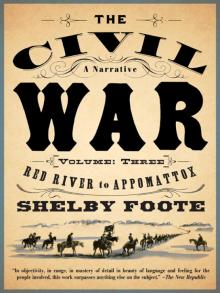 The Civil War: A Narrative: Volume 3: Red River to Appomattox
The Civil War: A Narrative: Volume 3: Red River to Appomattox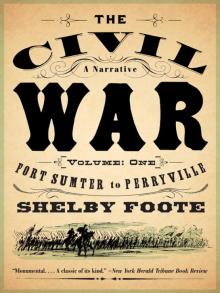 The Civil War: A Narrative: Volume 1: Fort Sumter to Perryville
The Civil War: A Narrative: Volume 1: Fort Sumter to Perryville Jordan County
Jordan County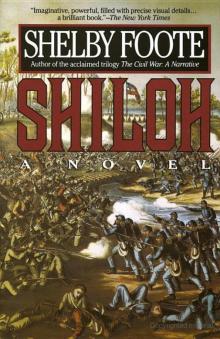 Shiloh
Shiloh Love in a Dry Season
Love in a Dry Season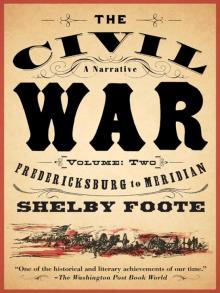 The Civil War: A Narrative: Volume 2: Fredericksburg to Meridian
The Civil War: A Narrative: Volume 2: Fredericksburg to Meridian Chickamauga
Chickamauga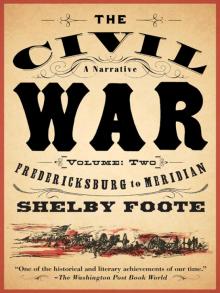 The Civil War: A Narrative: Fredericksburg to Meridian
The Civil War: A Narrative: Fredericksburg to Meridian